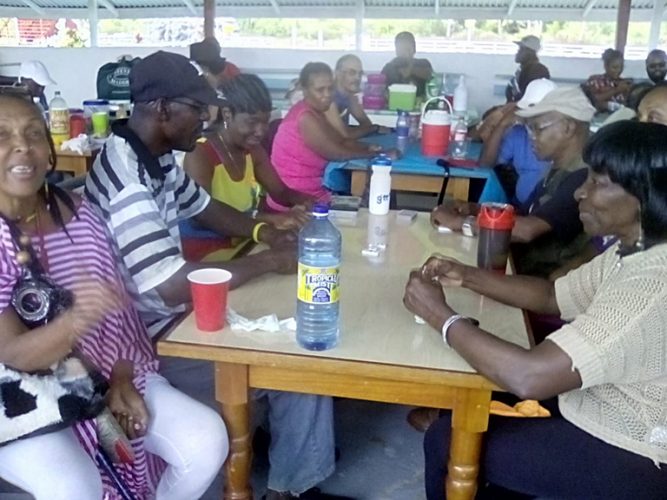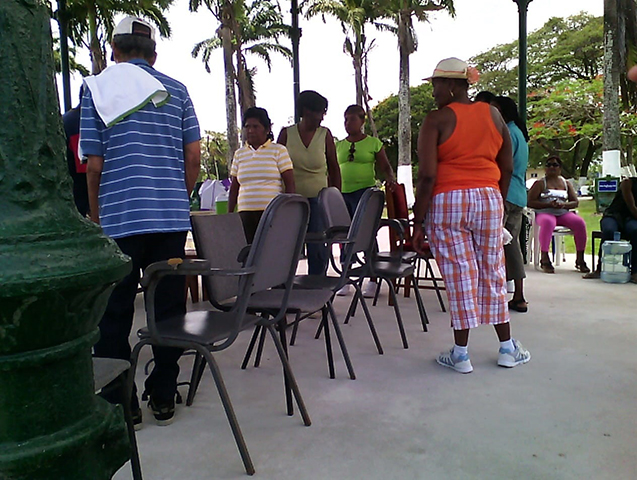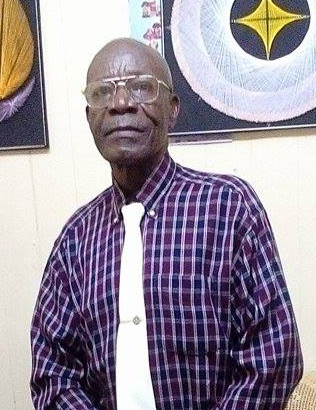It was a normal Sunday for Michael Edghillo 12 years ago and he went to work just as he had done for some 31 years as a maintenance engineer for the power company. He ignored the heaviness he felt in his leg and later the fact that his right hand refused to do as he commanded.
“I took it for nothing and I try to go about my normal day but it was during the night when I got up to go to the toilet I realised that my right leg was not moving…,” the now 71-year-old Edghillo said during a recent interview at his Pike Street, Kitty home.
Hours later, he visited the doctor and was told that he was getting a stroke and at that time he thought the symptoms that could be reversed and remained optimistic as he was sent home with medication.

“I did not panic but by the next day I could not move, and my daughter said it is time for hospital and I went and spent four days in the Mercy Hospital,” he recalled.
According to the UK-based Stroke Association website, a stroke is a brain attack. It happens when the blood supply to part of the brain is cut off, killing brain cells. Damage to the brain can affect how the body works. It can also change how you think and feel. It was stated that the effects of a stroke depend on where it takes place in the brain, and how big the damaged area is.
After the stroke attack, life as Edghillo knew it changed. But being a positive individual, Edghillo said, he immediately knew he had to fight, and it was that fight the doctor saw in him when he discharged him and told him to continue the battle at home. While he knew physiotherapy was a must, the father of four knew if he was to live his best life after the stroke, he must look on the brighter side of things.

It is that mindset that has seen him soldiering on 12 years after the attack and today he lives alone and boasts that he does “everything for myself”. He ensures he takes an early morning walk and his diet is right. When he shops in the market and purchases coconuts, persons would ask how he plans to grate them. “I would tell them they need to come and see how,” he said with a laugh adding that while his right hand has never been the same, he does not allow the disability to inhibit him from doing what he needs to do.
But Edghillo is aware that not all persons who are attacked by stroke have his positive outlook on life and some might need some extra support. It is precisely for that reason and the fact that he wants to continue to contribute that he has taken up the challenge of being the president of Guyana’s first Stroke Survivors Support Group.
The association now has 75 members and there are times, according to Rehabilitation Assistant at the Palms Rehabilitation Department Melanie Alleyne, when persons who have had massive brain injuries or some spinal injury also join the group’s activities.

Edghillo makes it clear that the idea of the group was not his, but it was suggested at the physiotherapy department and while a start was made personality clashes resulted in it being dormant for a while. Maybe it is because of his positive outlook that he was again approached to be a part of another start-up of the association and this time around things are clicking, as it was recently registered under the Friendly Societies Act. They meet on the last Thursday of every month at the Ministry of Education Complex on Carifesta Avenue, where the members are encouraged to talk to assist in the process of building self-confidence.
“You see people with stroke are withdrawn… The association helps them to realise that there is life after stroke. We interact a lot and every three months we go on an outing planned by the physiotherapy department,” Edghillo said.
Members contribute $200 a month and he said they are working on having a letterhead, stamp and a bank account with the hope that they can seek corporate sponsors in the future to assist members who are in need. The association is also now a member of the National Commission on Disability.
For Edghillo, the main concern stroke survivors have is isolation and, in some cases, “they bring it on themselves because if you are withdrawn from people, they would hardly come looking for you. No one knows how a stroke affects a person, only them and it does have some serious psychological and debilitating effects on persons.”
The group, he said, is trying to help its members to deal with such issues and from time to time talks are held and they also indulge in their own form of cricket and other fun games to get people involved.
‘Going into a hole’
Edghillo said he remembers the day 12 years ago when he got the attack and still sees it clearly in his mind. It was a Mother’s Day and he recalled that he had walked from Sophia to Kitty even though his feet felt like they were “going into a hole” every time he took a step.
He tried to ignore what was happening to him and even assisted in the preparation of a Mother’s Day meal for his then reputed wife. It was as they were having a meal at the dining table that he realised his right hand was not working as it should.
Looking back, he believes it was stress at work that cause the stroke and he remembers always “pushing myself to get the work done and not taking care of myself, not watching my diet not taking care of my health.”
Following the stroke, he adjusted his life and for him it was not difficult. On May 12, 2007 he left the power company through early retirement after 31 years.
“I just had to accept it and I am grateful for my upbringing… it helped me to adjust to my new life,” he said.
He recalled that shortly after he got the attack, he had asked his eldest daughter, who works with the power company, what was happening at work and she indicated that they were planning the Christmas party.
“So, I told her by then I would be back, and she looked at me with this eye, you knowing saying back where? It was as if to say I must take care of myself,” he said, finding humour in the memory.
He is happy to use his experience to help members of the group and shared that a supervisor of his also had a stroke, but he eventually died.
“He died in depression because he never really accepted what happened to him and it was like if he was ashamed, he didn’t want to go out and so on,” he said.
Two other former colleagues are also now in therapy and Edghillo remembered telling them, “you don’t like to see good people do things, you have to follow them.” It was his way of making the process easier for them.
“For me I am not just surviving, I am living life to the fullest within the limitations I have after accepting I could no longer skip, hop and jump,” he said with a smile.
He is proud that he can still do everything for himself even though he receives maximum support from his five children, with whom he shares very good relations.
He admits that many times persons with stroke will feel downtrodden, but he wants them to know that life goes on and they just have to adjust their lives to meet their physical limitations and take it one step at time.
Continue to fight
Fight is just what Ann Spencer does. She is a committee member of the group, who had her first attack five years ago.
She said that she had another attack recently, but she continues to fight and still takes cares of all her physical needs.
The journey for her has been different from Edghillo as she had her first attack at 55 but continued to work as a sweeper/cleaner at Queen’s College until last February. She wanted to ensure that she worked until she was age 60, an age she attained last December, to ensure that she got her gratuity. She told of how the school’s board wanted to send her home as medically unfit, which would have seen her losing her benefits even though according to her she worked, and her only disability was “my foot dragging when I try to walk too fast.
“It was not easy, but I thank God that I am still alive. While I was in hospital my big daughter, who went with me to the hospital, she died, I don’t know how she just died at age 30-something. I can’t even remember all that happen because I just did get the stroke,” she shared tearfully.
Spencer’s attack came one morning when she woke up and found that she could not move. She buried her daughter and fought to remain on the job for five years and during that time she also lost her son to inflammation of the brain. She now has two children remaining, but she said she finds joy in them and her three grandchildren.
While she officially retired in February this year, the school only paid her the gratuity on October 10, after interventions by her union. “But I am happy, you know. I have to live and do everything for myself and that is why I am a part of the association,” she said.
Clinic
Meanwhile, explaining how the physiotherapy clinic works, Alleyne said that usually people come to them in an acute state and they work with them in the mornings. But as they progress, they are phased out to afternoon sessions and then to the activity group which meets on Mondays and Wednesdays from 9 am to 11 am during which they are involved in more rigorous exercises and games. This then leads to hydrotherapy of which the patient receives six sessions, a programme that started about a year ago. It is upon completing these phases that the survivor is then put on to the association and according to Alleyne it has proven to be a very good support system. She pointed out that it is better for them to be in numbers and now they can register with the commission on disability as a body instead of an individual.
Alleyne and her colleague Gracella Bacchus are the ones who lend support to the group and they plan the activities for them every month. She encourages survivors to become part of the association, adding that soon they would just give technical support to the association as its membership continues to grow.
The vision of the group is to improve the lives and status of persons living with stroke. It also envisions providing survivors with new skills and techniques that will place them back in society.
It is expected that it will support, uphold and respect every stroke survivor regardless of scholastic ability, economic status, or ethnicity. A forum is also expected to be created through which the group represents persons with stroke disabilities and also to support each other.
The Palms Rehabilitation Department is the registered office of the group and persons can contact same if they want to become members.






